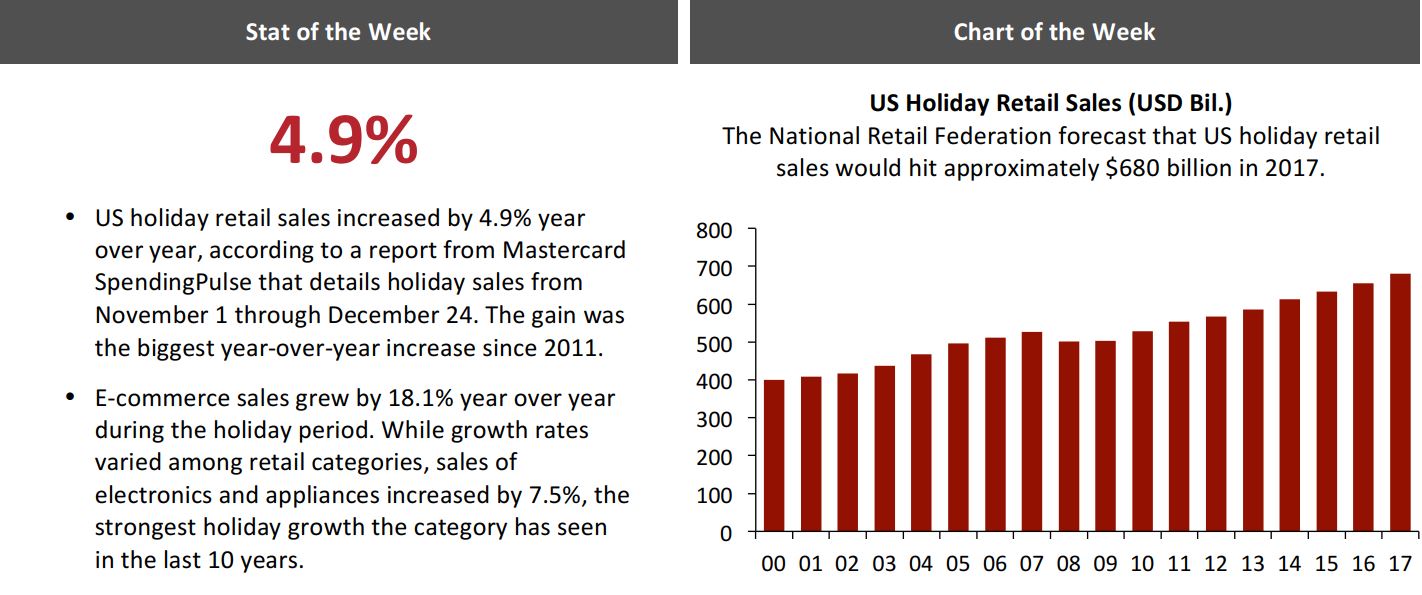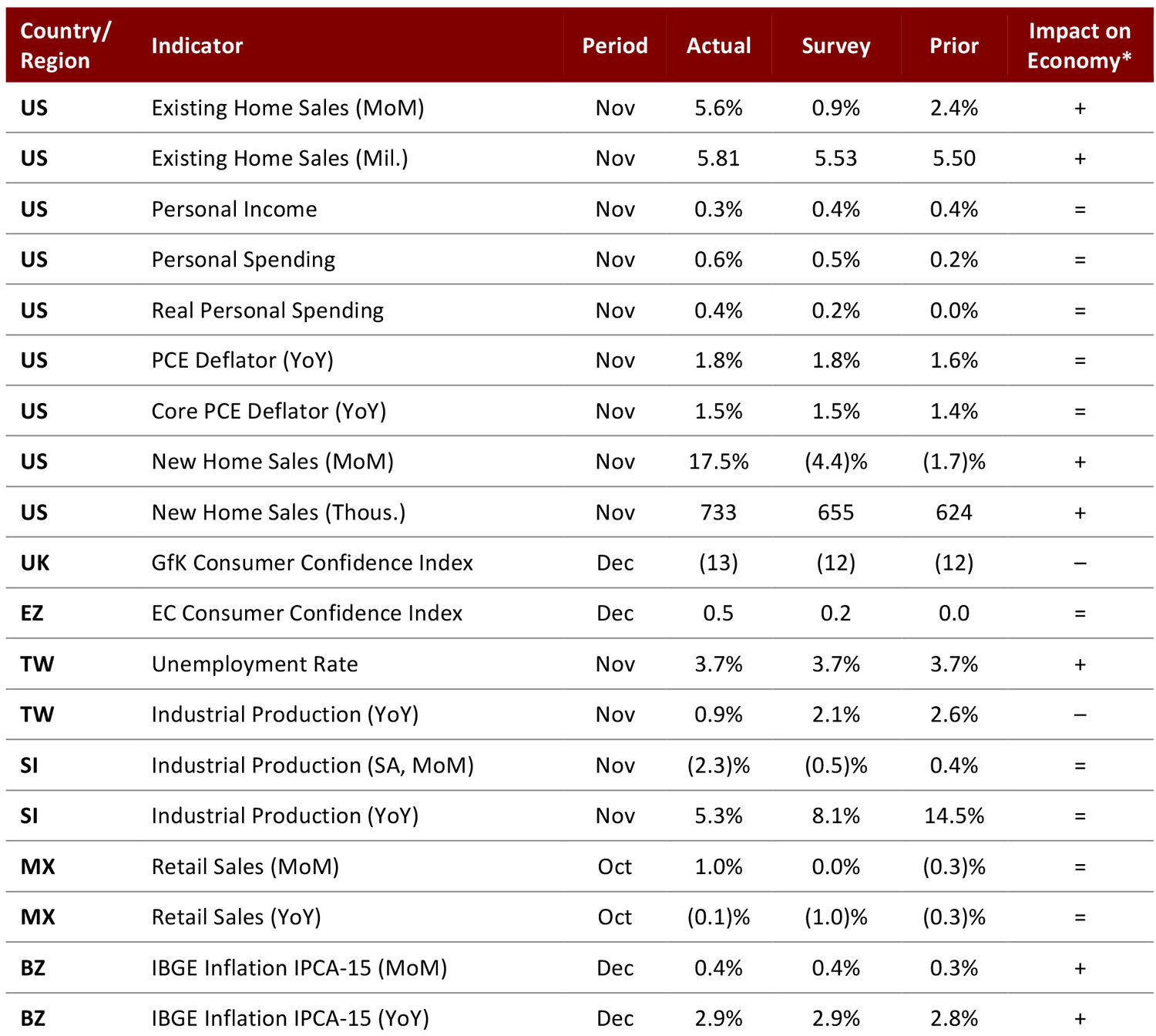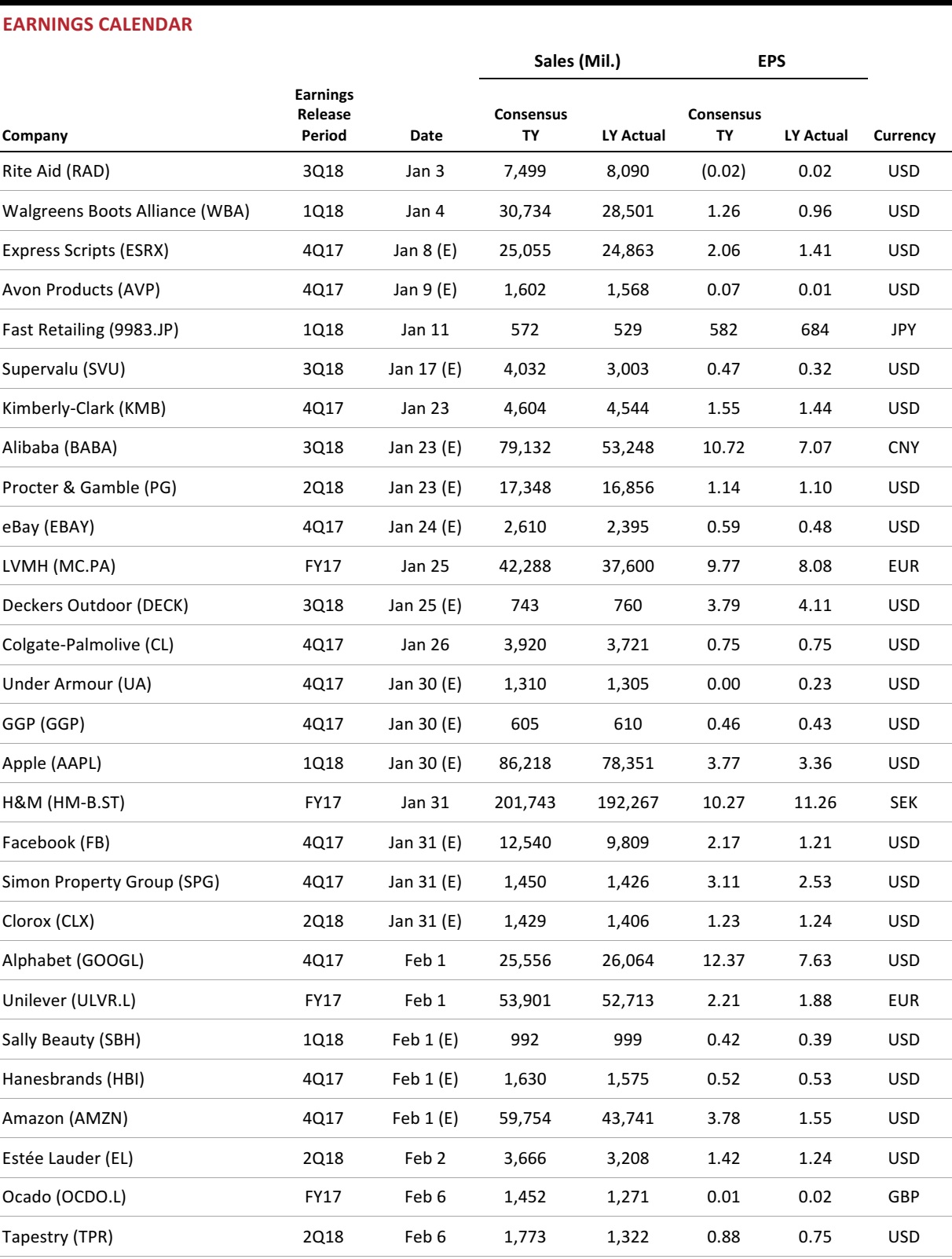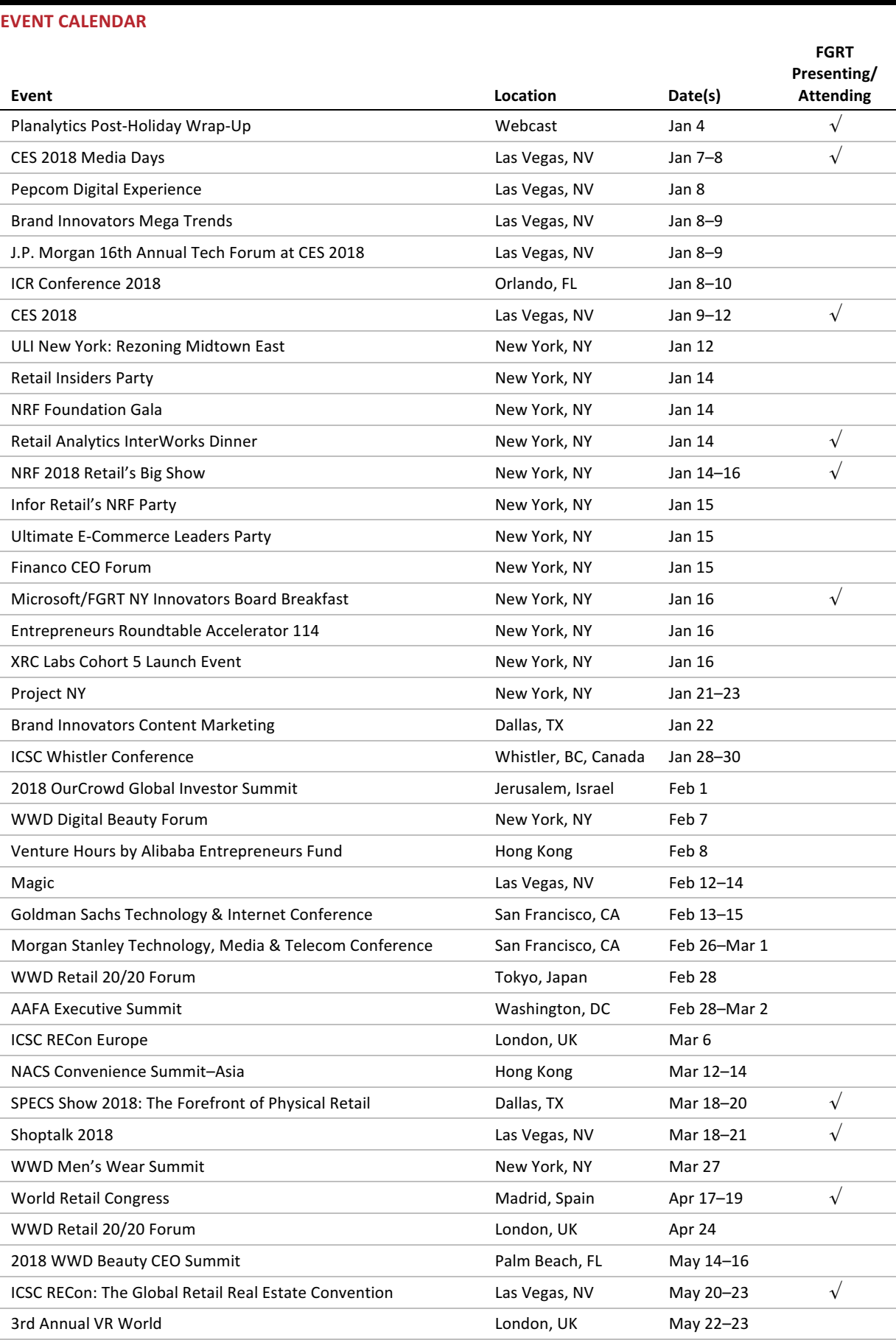
Source: Mastercard Spending Pulse & National Retail Federation/Statista
From the Desk of Deborah Weinswig
Happy Holidays (and Many Happy Returns)!
Although the major holiday shopping days—Black Friday, Cyber Monday and Super Saturday—are now behind us, retail activity is continuing at a strong pace. Mastercard SpendingPulse reported that US holiday sales increased by a healthy 4.9% this year, exceeding most forecasts, and that online holiday sales increased by a whopping 18.1% year over year. Holiday shopping did not come to a halt on
Christmas morning, though. The shopping will continue this week and beyond as consumers return to physical stores to enjoy after-Christmas sales, make returns or exchanges, take advantage of special shopping holidays, and redeem gift cards.
Many retailers are offering incentives to keep sales flowing, close out holiday merchandise and capitalize on consumers’ return visits to stores. Most major retailers—including Kohl’s, Macy’s, Nordstrom, Old Navy, Target, Walmart and Williams-Sonoma—are running sales now, with discounts ranging from 20%–70%. Amazon is offering year-end deals on its own consumer electronics devices as well as on toys and games, electronics, health and personal care, tools and home improvement, and many other items.
Returns represent an enormous cost (and opportunity) for retailers. Consumers are expected to return $90 billion worth of goods this holiday season, according to reverse logistics company Optoro, and that figure has been growing steadily as e-commerce’s share of sales has increased. The company further estimates that holiday returns account for nearly a quarter of all returns throughout a given year.
Returns represent multiple costs for retailers, since less than half of returned goods can be sold again at full price. Optoro, which helps retailers get returned goods to their best markets, estimates that many retailers receive only 15–30 cents on the dollar for returned merchandise. Yet returns also offer additional opportunities for retailers: when consumers visit physical stores to return or exchange items, retailers have the potential to upsell them or sell them additional, unplanned items. Experts say that US in-store conversion rates range from 15% to 30%, so retailers could generate additional sales in the billions by catering to shoppers who visit stores to make returns.
Amazon, still basking in the afterglow of its successful Prime Day this July, is offering yet another self-created shopping holiday, called Digital Day, for the second year running. Digital Day takes place on December 29, and Amazon will offer discounts of up to 80% on apps, games, e-books, movies and more that day. The company plans to offer 40% more deals than last year. Following analysts’ comments that Amazon Prime membership has likely peaked, the company announced that 4 million people had recently trialed its Prime service and that it had been a record holiday for Amazon devices. Both new subscribers and devices fuel the virtuous circle that drives demand for additional content and further locks in consumers to Amazon’s platform.
Gift card redemptions also draw consumers into physical stores, presenting retailers with additional revenue opportunities. Gift cards are expected to hit $160 billion in total volume next year, according to Gift Card Granny, an online discount gift card and comparison site. The company further estimates that 65% of consumers spend an additional 38% beyond the value of each card they redeem. Digital gift cards are increasing in popularity, and are estimated to hit $15 billion this year.
Early results suggest that retailers saw a robust holiday shopping season that breathed some much-needed life into a year beset by negative headlines regarding bankruptcies, store closures and soft same-store sales. The good news is that the year is not yet over. There have been plenty of additional bargains to be had this week, and post-Christmas sales will continue. In addition, consumers have just started redeeming their holiday gift cards.
The FGRT team will continue to follow the final results from this year’s holiday shopping season, and we have already started to formulate our views of 2018, which we will present shortly. In January, we will offer on-the-ground coverage of the annual CES event in Las Vegas, followed closely by the NRF 2018 Retail’s Big Show in New York, in addition to other news and events.
We wish you prosperity and success in 2018!
US RETAIL EARNINGS

Source: Company reports/FGRT
US RETAIL & TECH HEADLINES
 US Online Retail Giant Announces “Biggest Holiday” Sales Gain
(December 27) XinhuaNet.com
US Online Retail Giant Announces “Biggest Holiday” Sales Gain
(December 27) XinhuaNet.com
- US online retail giant Amazon announced Tuesday that it sold more than 1 billion items from small businesses and entrepreneurs worldwide during the period from Thanksgiving to Christmas.
- Amazon said that it has sold “tens of millions” of Echo devices worldwide and that the Echo Dot and Fire TV Stick with Alexa Voice Remote were the most popular products on Amazon across all categories. The company said that it is celebrating its “biggest” holiday sales surge “with customers all around the world shopping at record levels.”
 The US Retail Sector’s Hurting? Dollar General Plans Expansion with 400 New Jobs
(December 27) USAToday.com
The US Retail Sector’s Hurting? Dollar General Plans Expansion with 400 New Jobs
(December 27) USAToday.com
- Dollar General’s rapid growth continued as the discount retailer announced plans for its 17th US distribution center, a facility of nearly 1 million square feet that is expected to create approximately 400 new jobs. Projected for an early 2018 construction start in Longview, Texas, the facility will help supply the company’s nearly 1,400 stores across the state.
- The expansion comes weeks after Tennessee-based Dollar General said it would open 900 new locations, adding to its roster of nearly 14,000 stores.
 US Retail Holiday Sales Jump 4.9%, Biggest Increase Since 2011
(December 26) USAToday.com
US Retail Holiday Sales Jump 4.9%, Biggest Increase Since 2011
(December 26) USAToday.com
- Despite thousands of store closings this year, Americans supplied a final flurry of spending to give retailers their best holiday season sales since 2011. US year-end holiday retail sales rose by 4.9% compared with the same period last year.
- Online retail shopping similarly increased, by 18.1%, while overall consumer buying during the holiday period set a record for dollars spent, according to a sales report issued by Mastercard SpendingPulse.
 US Retailers in Dire Need of Growth Look to the China Market
(December 26) RetailWire.com
US Retailers in Dire Need of Growth Look to the China Market
(December 26) RetailWire.com
- In 2017, a growing number of Western retailers decided to go where they can grow. Toys“R”Us, Starbucks and now Walgreens are among the retailers expanding their brick-and-mortar and e-commerce presence in China’s booming retail market.
- As Chinese consumers’ affluence has increased, so has their appetite for foreign products. For instance, popular product categories for cross-border e-commerce shoppers in China include cosmetics, mom and baby products, and nutritional supplements.
 US Retail Bankruptcies Hit Six-Year High in 2017
(December 21) FoxBusiness.com
US Retail Bankruptcies Hit Six-Year High in 2017
(December 21) FoxBusiness.com
- Bankruptcies among US retailers reached a six-year high in 2017 amid declining foot traffic and the rise of e-commerce giants such as Amazon. Some 50 retailers filed for bankruptcy this year, including onetime giants Toys“R”Us, RadioShack and Payless.
- That is the highest number of bankruptcies since 2011, when 59 companies filed for the protection, according to data from S&P Global. Big-box stores such as Macy’s and Sears accounted for 43%, or about 43 million square feet, of shuttered US retail space in 2017.
EUROPE RETAIL & TECH HEADLINES
 H&M to Launch New Fashion Brand Nyden
(December 21) UK.FashionNetwork.com
H&M to Launch New Fashion Brand Nyden
(December 21) UK.FashionNetwork.com
- Swedish fashion group H&M is set to launch a new brand called Nyden in 2018. The millennial-focused line will be designed by H&M exec Oscar Olsson and influencers that are “tribe leaders”—celebrities and social media personalities that influence trends among groups of consumers.
- The influencers will have access to Nyden’s Los Angeles–based design lab, which has a large repository of preapproved fabrics to choose from. The preapproval is meant to reduce the lead time between concept and delivery to three or four weeks. Nyden’s products will be sold online or at mixed-reality pop-up events.
 Matchesfashion.com to See Record-Breaking Sales This Holiday Period
(December 22) RetailGazette.com
Matchesfashion.com to See Record-Breaking Sales This Holiday Period
(December 22) RetailGazette.com
- British online fashion retailer Matchesfashion.com is set to see record-breaking sales this holiday period, following a strong year of sales and growth. At peak times in December this year, the retailer has been selling 600 items per hour, which equates to about one item every six seconds, up from 514 in 2016, the company said.
- In addition, Matchesfashion.com reported a 103% jump in purchases made through its app, and said that average ticket size reached £1,748 ($2,346) for its 90-minute delivery service, in the six weeks ended December 10, 2017.
 Carrefour Unveils High-Tech Supermarket in Warsaw
(December 23) ESMMagazine.com
Carrefour Unveils High-Tech Supermarket in Warsaw
(December 23) ESMMagazine.com
- French retailer Carrefour unveiled a new hypermarket in Warsaw earlier in December that features a range of new digital retail solutions. The store spans 21,528 square feet and stocks nearly 13,000 food products. Shoppers can order any products unavailable in-store through one of the 19 interactive screens at the hypermarket.
- Customers can also use the Scan & Go service, which allows them to scan products themselves and pay for the purchase with their mobile phone. Machines in the store allow customers to generate receipts for their purchases themselves.
 UK Boxing Day Footfall Declines
(December 27) RetailGazette.com
UK Boxing Day Footfall Declines
(December 27) RetailGazette.com
- The number of Boxing Day bargain-hunting shoppers on UK high streets and at shopping centers fell at a rate “greater than expected” this year, according to market intelligence firm Springboard. Footfall fell by 4.5% during the day through 5 p.m. on December 26, 2017, marking the fifth drop on Boxing Day over the last six years.
- An increasing reliance on online sales, with most retailers commencing their sales on Christmas Eve, led to the drop, Springboard said.
 The White Company Grows Sales and Profits in FY17
(December 27) Drapers.com
The White Company Grows Sales and Profits in FY17
(December 27) Drapers.com
- British lifestyle brand The White Company grew its sales by 7.6%, to £194.8 million ($261.3 million), and grew its operating profit by 2%, to £17.6 million ($23.6 million), in the year ended March 25, 2017. “Solid growth” in sales at its UK stores and online helped performance.
- In the UK, the retailer opened two new stores and a concession, bringing its store count to 51 and its number of concessions to seven in the country. It also made its US debut with stores in New York and New Jersey, and opened a new store in Kildare, Ireland.
ASIA RETAIL & TECH HEADLINES
 China’s Didi Chuxing Raises $4 Billion More for AI, International Expansion and Electric Vehicles
(December 20) TechCrunch.com
China’s Didi Chuxing Raises $4 Billion More for AI, International Expansion and Electric Vehicles
(December 20) TechCrunch.com
- China’s Didi Chuxing, the country’s top ride-hailing company, said that it has raised $4 billion in new capital to support a range of new initiatives, including international expansion. The company has already raised $13 billion from investors that include Alibaba, Tencent and Apple, and it said that this newest round will go toward developing its artificial intelligence (AI) technology as well as international expansion and a green vehicle initiative.
- The company did not disclose the names of the investors in the round. In a statement announcing the funding, Didi said that “Chinese and international institutions joined the latest fundraising round,” which implies that a number of existing investors took part.
 Alibaba Cloud Is Opening Its First Data Center in India
(December 20) TechCrunch.com
Alibaba Cloud Is Opening Its First Data Center in India
(December 20) TechCrunch.com
- Alibaba is bringing its cloud-computing business into India as it continues to expand the fast-growing business unit. The Chinese firm said that its first data center on Indian soil will come online in January and be based out of Mumbai. The business already has clients in India, but a local presence will allow it to better service customers in the country, the company added.
- Beyond offering standard cloud products—such as large-scale computing, storage and big data capabilities—Alibaba will offer India-based customers access to elastic computing, databases, content delivery, networking, analytics, containers, middleware and security. The new center will give Alibaba Cloud 33 availability zones across regions that include China, Hong Kong, Singapore, Japan, Australia, the Middle East, Europe and the US.
 Russia Plans National Biometric Database Starting Next Year
(December 26) Bloomberg.com
Russia Plans National Biometric Database Starting Next Year
(December 26) Bloomberg.com
- Russia will get a country-wide biometric database for financial services starting next summer, the Bank of Russia said. The system will expand access to banking by letting people open accounts without having to visit a branch and is a key milestone in digitizing financial services, the central bank said in a statement. The regulator said that data would only be stored with individuals’ consent. Legal changes needed for the system were passed this month.
- State-owned Rostelecom has been selected to run the database, which will collect personal data, including images of faces, voice samples, and, eventually, iris and fingerprint images. Facial-recognition technology has been gaining consumer acceptance around the world, with Apple’s latest iPhone using it to unlock the device. In Russia, the authorities and government-linked companies are leading the charge.
 Leshi Founder Ordered Back to China to Sort Out Finance Woes
(December 26) Bloomberg.com
Leshi Founder Ordered Back to China to Sort Out Finance Woes
(December 26) Bloomberg.com
- China’s stock regulator issued an order late Monday for Leshi founder Jia Yueting to return to the country before the end of the year to deal with the company’s financial woes. The China Securities Regulatory Commission (CSRC) said that despite repeated calls from the regulator, the founder has yet to show up and deliver on his promise to provide interest-free loans to Shenzhen-listed Leshi Internet Information & Technology, which is mired in a “huge amount of debt.”
- The CSRC has been pushing for Jia’s return since September. “The debt has yet to [be] paid back,” the agency said in a statement. “It has severely hurt the interest of the listed company and investors and has had an extremely adverse social impact.” Jia made his fortune at Leshi with a video-streaming service similar to Netflix, but he borrowed heavily against his shares in the company to expand into new ventures, including smartphones and electronics.
LATAM RETAIL & TECH HEADLINES
 Brazilian Telcos Call for “Intelligent Net Neutrality”
(December 26) ZDNet.com
Brazilian Telcos Call for “Intelligent Net Neutrality”
(December 26) ZDNet.com
- Telecommunication companies in Brazil have started a debate about loosening net neutrality rules following the US’s decision to scrap its own regulation. After the US Federal Communications Commission (FCC) voted to scrap rules protecting net neutrality in America, Brazil’s National Union of Fixed and Mobile Telecom Companies (Sinditelebrasil) released a statement calling for the current rules to be reviewed to ensure “intelligent net neutrality.”
- “The telecommunications industry is in favor of intelligently applied neutrality, allowing companies to manage traffic on their networks with the goal of improving user quality and experience,” the organization said, adding that there should be no rules to interfere in the traffic management of telecommunication providers.
 Brazil Leads in E-Waste Generation in LatAm
(December 25) ZDNet.com
Brazil Leads in E-Waste Generation in LatAm
(December 25) ZDNet.com
- Brazil is the leader in electronic waste generation in Latin America, according to the latest Global E-waste Monitor, produced by the United Nations University (UNU). Some 3.3 million tonnes of e-waste were produced in the region in 2016, according to this year’s edition of the study.
- Of all the electronic waste produced in Latin America in 2016, Brazil produced more than 2 million tonnes, up 10% over 2014. One of the main issues in tackling the problem is the lack of specific e-waste regulations in the region, the UNU report says.
 SAS Appoints New Latin America Head
(December 23) ZDNet.com
SAS Appoints New Latin America Head
(December 23) ZDNet.com
- Analytics firm SAS has hired Marvio Portela as its new head for Latin America following a series of changes in the local top leadership at the company in the second half of 2017. Portela was previously the firm’s head of sales performance and new business development for the Asia-Pacific region. The internal promotion will be effective January 1.
- Portela’s initial goals are set out in a 90-day plan. During that period, the executive will get acquainted with the overall objectives for the company for the coming three years, which include further expansion of analytics offerings based on the cloud, the Internet of Things and AI.
 Brazil Consumer Confidence Weakens for First Time in Four Months
(December 22) RTTNews.com
Brazil Consumer Confidence Weakens for First Time in Four Months
(December 22) RTTNews.com
- Brazil’s consumer confidence eased for the first time in four months in December as weaker purchasing power made many households cautious about making big purchases, survey data from think tank FGV showed. The consumer confidence index fell for the first time since August in December, dropping to 86.4 from 86.8 in November.
- “Consumers continued to improve their assessments and projections about the economy, but the level of indebtedness of households, especially those with lower purchasing power, led to caution while spending on high-value goods, thus limiting consumption,” FGV economist Viviane Seda Bittencourt said.
MACRO UPDATE
Key points from global macro indicators released December 20–27, 2017:
- US: Existing home sales increased by 5.6% month over month in November, to 5.81 million, beating the consensus estimate of 5.53 million. Personal income and personal spending both moderated upward in November, while the core Personal Consumption Expenditure (PCE) deflator stood at 1.5%.
- Europe: In the UK, the GfK Consumer Confidence Index further deteriorated in December, to (13); the reading was below the market’s expectation and last month’s reading, both of which were (12). In the eurozone, consumer confidence edged up in December to 0.5, which was slightly higher than the consensus estimate of 0.2.
- Asia-Pacific: In Taiwan, industrial production increased by 0.9% year over year in November, missing the consensus estimate of 2.1%. In Singapore, industrial production growth slowed to 5.3% year over year in November, following a big jump of 14.5% in October.
- Latin America: In Mexico, retail sales increased by 1.0% month over month in October, which was better than the market had expected, but decreased by 0.1% year over year. In Brazil, inflation moderated upward in December at a healthy pace.

*FGRT’s evaluation of the actual figure’s impact on the economy relative to historical benchmarks and the current macroeconomic environment: + indicates a positive signal for the country’s economy, – indicates a negative signal and = indicates a negligible or mixed impact.
Source: National Association of Realtors/US Bureau of Economic Analysis/US Census Bureau/GfK/European Commission/China Ministry of Economic Affairs/Singapore Economic Development Board/Instituto Nacional de Estadística y Geografía/Instituto Brasileiro de Geografia e Estatística/FGRT





 H&M to Launch New Fashion Brand Nyden
(December 21) UK.FashionNetwork.com
H&M to Launch New Fashion Brand Nyden
(December 21) UK.FashionNetwork.com


